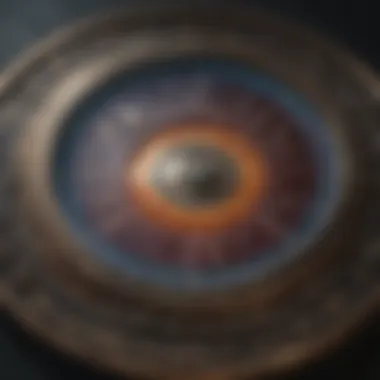Astrology: Importance of Birth Date, Time, and Place


Intro
Astrology, a practice that dates back thousands of years, holds a significant place in the exploration of personality and life journeys. At its core, the system thrives on the belief that the precise time, date, and place a person is born significantly shape their astrological chart. This interplay of celestial movements and earthly moments leads not just to the generalizations often found in horoscopes but rather to a complex tapestry that defines an individual's unique characteristics and potential life path.
By examining the celestial phenomena present at one’s birth, enthusiasts can gain invaluable insights into their nature and preferences. The constellations and planetary alignments not only determine one’s zodiac sign but also influence key aspects like emotional responses, career inclinations, and relational dynamics. As we dive deeper into the world of astrology, we'll uncover how these elements combine to create a personal map—a tool that can guide individuals on their journey to self-discovery and fulfillment.
With the importance of accuracy in mind, the article will walk readers through the crucial factors that contribute to one's astrological profile. Let's take a moment to explore the foundational aspects, providing a clearer picture of how the intricate details of birth can unlock the potential for personal growth and understanding.
Prelude to Astrological Foundations
Astrology, as a practice and belief system, has a long-standing history that intertwines the cosmos with human experience. This section endeavors to dissect the foundational elements that underpin astrology, particularly how the precise details of one’s birth—namely date, time, and place—create a personalized astrological chart. Understanding these foundations can illuminate the broader narrative of one’s personality traits, tendencies, and potential life paths.
Having a solid grasp of the astrological foundations is crucial for anyone aspiring to dive deeper into this ancient practice. It's not merely about reading horoscopes; it's about appreciating the intricate tapestry woven by celestial bodies in relation to our lives.
Conceptual Overview of Astrology
At its core, astrology posits that the positions and movements of celestial bodies can exert influence on human affairs. Think of it as a cosmic dance; the planets, the moon, and the sun each play distinct roles, shaping our personalities and guiding our experiences.
Astrology can often feel intimidating, especially for newcomers. However, grasping its basic concepts can ease the journey. Consider these fundamental ideas:
- Celestial Influence: Each celestial body has specific traits that can impact individuals born under various alignments.
- Birth Chart: A visual representation of the sky at the moment of one's birth— this is the foundation upon which all astrological interpretations are built.
- Zodiac Signs: The twelve signs correspond to specific time frames throughout the year and influence individual character traits.
- Houses and Aspects: These dictate how various planets interact in an individual's chart, unveiling deeper layers of interpretation.
It's essential to note that astrology is not rigid; it's an art as much as it is a science. Just as a painter uses different techniques, astrologers blend various factors. For example, consider the influence of Mercury on communication styles. Someone with Mercury in retrograde may experience challenges in communication, revealing layers of nuance in interpersonal dynamics.
Astrology is a mirror reflecting the celestial harmonies of your inner self.
In summary, the introduction to astrological foundations sets the stage for the journey through the complexities of astrology. As we delve deeper into the specific roles of birth date, time, and place, we can begin to truly appreciate the fine details of what shapes us as individuals, navigating the unique path laid out by the stars.
The Role of Birth Date in Astrology
The date on which an individual is born serves as a pivotal cornerstone in the realm of astrology. It acts as the initial brushstroke on the canvas of one’s astrological profile. The astrological significance of birth dates can be linked to various celestial influences that correspond with specific periods throughout the year. By examining these influences, one can begin to uncover the nuances of personality traits and potential life paths shaped by celestial movements at the time of one’s birth.
Astrological Significance of Different Dates
Each day in the calendar carries its own set of celestial alignments and energies, influenced by the movement of the sun, moon, and other planetary bodies. These influences can be thought of as distinct vibes that impact not just an individual’s character, but also their journey through life. For instance, someone born on the 15th of June may tap into the vibrant energy of the Gemini sun phase, being naturally curious and communicative, whereas a birth date on the 21st of September under the Libra sun suggests a more balanced and harmonious disposition.
Moreover, the specific day of the month often dictates how planets are positioned in relation to that individual's sun sign. Each month is interspersed with pivotal astrological events such as new moons, full moons, or eclipses which further intensify the intrinsic characteristics associated with that date. As such, astrological significance isn’t just confined to the sun sign; it branches out into a multitude of traits and potential challenges an individual might encounter through their life.
"Astrology doesn’t dictate fate; it provides a map, offering insight into the patterns and potential paths we can explore."
As we investigate the significance of dates further, one finds that even minor adjustments to one’s birth date can lead to substantial shifts in astrological guidance. Interestingly, examination of numerology can also play a role in understanding an individual's traits, deriving meaning from the numeric representation of a birth date which might align with certain astrological attributes.
Zodiac Signs and Their Birth Periods
Diving deeper into the zodiac signs, every sign spans a particular date range that provides context about how various birth periods give rise to distinct traits. For example, Aries individuals born between March 21 and April 19 often exhibit qualities like boldness and impulsiveness, traits that align seamlessly with the essence of initiation associated with this fire sign.
On the flip side, those born during the Taurus period from April 20 to May 20 generally embrace a more grounded and practical approach to life. The earth energy of Taurus is reflected in their consistent demeanor and preference for stability. Each sign comes with its unique flavor, shaped by the celestial aspects applicable to those born in their defined periods.
It's also important to note that people born at the cusp of two zodiac signs, such as those born on the 20th of April, may exhibit traits from both signs involved. This blending of characteristics can add complexity to their astrological profile, suggesting that the exact timing and date of birth contribute richly to an individual's astrological reading.
Ultimately, the date of birth is more than just a number; it acts as a guiding star on one’s personal path, influencing decisions, relationships, and self-perception throughout life's journey.
In summary, understanding the importance of one's birth date leads to a comprehensive grasp of the multifaceted nature of astrological interpretations. Whether one seeks clarity in relational dynamics or guidance for personal ambitions, observing how birth date conditions interaction with the cosmos can yield a wealth of insight.
The Importance of Exact Birth Time
The precision of your birth time is a fundamental element in astrology that can not be overstated. Just as a recipe requires exact measurements for a dish to turn out just right, your astrological chart relies heavily on knowing the hour and minute of your birth. This exactitude opens up more refined insights into your unique character and potential—insights that mere dates could miss altogether.
To illustrate, each moment carries a certain energy, and this cosmic energy helps define your ascendant sign, which is often referred to as your rising sign. The ascendant sign plays a vital role in how you present yourself to the world, influencing your appearance, demeanor, and how you interact with others. Without the exact birth time, determining your ascendant would be like trying to hit a bullseye blindfolded.
Additionally, an accurate birth time affects the positioning of planets in your natal chart. This positioning can reveal significant aspects of your temperament, emotional tendencies, and life experiences. When taken into account, the exact hour can alter the planetary picture considerably, providing depth that can assist you in navigating your path more intuitively.
"In astrology, it's not just about the signs; it's about the timing that makes every individual experience different."
Thus, the consideration of exact birth time stands as a cornerstone for deeper astrological interpretations and insights.


How Birth Timing Influences Ascendant Signs
The ascendant sign is the first impression you give to the world; it manifests through your physical appearance and mannerisms. It is the zodiac sign that was rising on the eastern horizon at your birth. If someone is born at exactly midnight, their ascendant might differ significantly from someone born just a few minutes later. As the earth rotates, each sign rises approximately every two hours, so a variance of even minutes can shift your rising sign.
This sign acts as a lens through which all other astrological elements are filtered. For instance, a Leo rising might present a warm, ebullient persona while a Pisces rising could reflect a more dreamy, sensitive character. Therefore, having an accurate birth time can unveil nuances in one's personality and behavior that could otherwise be overlooked.
Impact on Planetary Positions
Planetary positions in an astrological chart are determined not just by the birth date, but also the exact time of birth. Each planet moves through the zodiac at different speeds, making their alignment with the signs change over minutes. This phenomenon affects the houses in which the planets reside.
Planetary positions are broken down into twelve houses, each representing different facets of life such as career, relationships, and personal development. If your birth time is inaccurately recorded, the planets could reside in different houses altogether, leading to a misrepresentation of your potential challenges and strengths.
To sum it up, neglecting the precise birth time could lead to a skewed understanding of one’s entire astrological framework, obscuring paths to personal insights and growth. Thus, the value of knowing when you were born transcends mere curiosity—it's about unlocking the full scope of your astrological identity.
Geographical Influence: The Birth Place
The geographical location where one is born carries significant weight in the realm of astrology. Each place on Earth presents unique energies and cosmic influences that can shape an individual’s astrological profile. This section dives into the nuances of how your birth surroundings interlace with your astrological chart, ultimately impacting your personality and life experiences.
Time Zones and Their Effects on Astrology
Time zones radically alter how celestial bodies are positioned at the moment of your birth. If two individuals are born on the same date and minute, but in different locations, their astrological charts may still differ due to the time zone discrepancies. For instance, a person born in New York City at noon may have a distinctly different chart than someone born in London at the same time, as the local time is adjusted for the respective zones. The sun, moon, and rising signs reflect the immediate cosmic backdrop, influenced heavily by where the birth takes place.
Understanding time zones is paramount not just for accurately calculating planetary positions but for ensuring the astrological insights are precise.
- Key considerations include:
- The local time at the place of birth is crucial for rectifying the positions of ascendants and planets.
- Adjusting UTC to local time helps avoid errors that could lead to misinterpretations of a person's chart.
- The concept of daylight saving time can further complicate matters and should be factored in when calculating.
In astrology, precision is king, and so knowing the exact time zones related to not just the birth date but also the geographical location adds layers of depth to the interpretation.
Cultural Implications of Birth Location
The culture of the locale during an individual's birth significantly affects the interpretation of their astrological chart. Different cultures have their own interpretations of zodiac signs and planetary influences, which may lead to diverse understandings of an individual’s characteristics and destinies. Each place comes with its history, traditions, and symbolic meanings that the collective consciousness has etched into the zodiac.
For instance, someone born in a metropolis like Tokyo might absorb the bustling energy and advancements of modern living, thus influencing their traits toward dynamism and innovation. Conversely, a child born in a tranquil rural area might embody traits that align more with a serene, balanced existence.
- Cultural factors to consider:
- Local beliefs and attitudes towards astrology can color an interpretation—some cultures may emphasize certain traits more than others.
- Historical events surrounding the birth year can also offer context for personal challenges or advantages.
- How the community views the lunar phases or planetary transits might inform the individual’s experiences as they grow.
"Astrology is not just a celestial science; it is influenced by the very soil upon which we stand, shaping our destiny through cultural lenses."
In short, the geographical influence, both through time zones and cultural context, is not just a factor—it’s a tapestry of influences that weaves together to enrich the astrological readings of individuals, showcasing how environment and identity are inextricably linked.
Calculating Birth Charts
Calculating a birth chart is at the heart of astrological practice. It’s not just about making random predictions; it requires thoughtful analysis, using precise information such as date, time, and place of birth. The resultant chart maps the heavens at the exact moment of one’s entrance into this world, offering invaluable insights into personal traits, challenges, and potential life paths. So, why does one need a birth chart? Essentially, it’s like a cosmic fingerprint, showcasing your intricate individuality.
Notably, the process entails various elements that work together to form your unique astrological identity. Each component of the chart plays a significant role and can guide you to a profound self-understanding. Here’s a closer look into its essential features:
- Planets: They represent energies and influences in your life, from your emotional responses to your career choices.
- Signs: These define the character of the planets, impacting how their energies will manifest in your life.
- Houses: They indicate the areas of life affected by the planets' positions, covering everything from relationships to career.
- Aspects: The angles between planets reveal how they interact, highlighting areas of harmony or tension.
When calculating your birth chart, you engage with a multidimensional language of celestial influence, something that invites further exploration.
Elements of a Birth Chart
Understanding the elements of a birth chart is crucial. Each part works together to weave the tapestry of one’s astrological identity.
- The Sun Sign: Often recognized as the star of the show, it governs core personal identity and overall character. It’s essentially your ego and basic self-expression.
- The Moon Sign: This reflects your emotional landscape and subconscious; it’s what drives you internally.
- The Rising Sign (Ascendant): This is the mask you wear in public, the impression you make on others, often acting as a filter for your Sun and Moon.
- The Houses: There are twelve houses in astrology, each focusing on different aspects of life like love, work, and spirituality. Where the planets sit in these houses can speak volumes about your priorities and challenges.
Understanding how these elements play a role forms the basis for interpreting your life as written in the stars.
Software and Tools for Chart Calculation
With today’s technological advances, calculating a birth chart can be simpler than ever. Various software and online tools can provide detailed analyses. They can help you get a peek into celestial alignments without needing to manually calculate the exact positions of the planets.
Here are a few widely used options:


- Astro.com: This site is often a go-to for in-depth charts and interpretations.
- AstroSeek: Offers a variety of calculators including compatibility charts.
- TimePassages: This software provides a mobile-friendly option, making it convenient to use on the go.
These tools often allow for customization, letting users input specific birth data and generating a personalized chart effortlessly. Familiarizing yourself with software is a handy step to ensuring accuracy.
In summary, calculating your birth chart and understanding its elements can be a mind-expanding journey. Aligning your cosmic map offers a richer sense of who you are, where you might be headed, and what you may encounter along the way. This process invites a deeper inquiry into both yourself and the universe you inhabit.
Interpreting Your Birth Chart
Interpreting your birth chart is akin to peeling back the layers of an onion, revealing the depths of one's personality and behaviors. The chart serves as a celestial map, accurately reflecting the positions of the celestial bodies at the moment of one's birth. This incredible tool can provide guidance in navigating life’s complexities, helping individuals gain a clearer understanding of themselves.
The significance of the birth chart extends beyond mere astrology—it's a bridge connecting personal traits with the cosmos. The chart is generally divided into different elements:
- Planets: Which indicate eleven various energies and influences.
- Signs: Each planet resides in one of the twelve zodiac signs, impacting how that planetary energy is expressed.
- Houses: The twelve houses represent different areas of life, and each house hosts a sign and its ruling planet, signifying where experiences happen.
When one learns to interpret their birth chart, they can unlock critical information about their innate tendencies and genuine desires. It can inform one's strengths and weaknesses, allowing for personal growth and awareness. Finding harmony in these aspects is essential for navigating various life situations—whether it's career choices, relationship dynamics, or personal challenges.
"The birth chart is a personal blueprint, illuminating both the challenges and the strengths inherent in your life path."
Understanding the Ascendant and its Relevance
The ascendant, or rising sign, holds a critical position in the astrological chart. It represents the zodiac sign that was rising on the eastern horizon at the time of birth. The ascendant is often referred to as the 'mask' one wears in public, influencing how others see and perceive an individual. It's important to grasp that this is not just a cosmetic facade; it also plays a vital role in defining one's personality.
For instance, two individuals may share the same sun sign but have different ascendants, resulting in distinctively different personalities. This aspect highlights the ascendant's role in determining outward behaviors and initial reactions to the world. Understanding your ascendant can provide insights into:
- First Impressions: How others perceive you upon meeting.
- Approach to Life: The general attitude and energy you showcase.
- Interaction Style: Your communication norms and styles with others.
A deeper comprehension of one's ascendant leads to a more rounded understanding of how one's identity manifests in various social contexts and interactions.
Analyzing Houses in Astrology
The astrological houses outline different domains of life experiences, from relationships to career paths. Each house corresponds to specific life affairs and starts at the ascendant point in the chart. To interpret the houses, one must understand their individual meanings:
- First House: The self, appearances, and how individuals view you.
- Second House: Personal finances, material possessions, and values.
- Third House: Communication and connections with siblings.
- Fourth House: Home, family, and emotional foundation.
and this goes on all the way to the twelfth house.
By examining which signs and planets sit in each house, one can uncover patterns and experiences likely to arise throughout a person's life. For instance, if someone has Venus in their seventh house, relationships may often be a focal point, indicating that connections and partnerships will play a significant role in their life journey.
As one dives into analysis, it becomes apparent that the interrelationship between planets, signs, and houses offers a multi-dimensional view of a person's existence. Thus, rather than merely accepting life circumstances, understanding one's houses prompts individuals to see how they might navigate their path more intentionally and insightfully.
Astrology and Personal Growth
Astrology has long been regarded as more than just a tool for predicting future events; it serves as a meaningful framework for personal growth. When you delve into your astrological chart, you're embarking on a journey of self-discovery that goes beyond the superficial traits associated with your zodiac sign. Understanding the astrological components of your being can illuminate your strengths and vulnerabilities, offering valuable insights into how you navigate life’s challenges.
Astrology fosters a perspective that can catalyze personal development. It encourages individuals to disregard the norms and expectations set by society and instead, embrace their unique vibrance. By recognizing patterns in your chart, you can identify areas that may require focus, growth, or healing. This practice helps cultivate the mind, allowing you to seek improvements that align with your astrological makeup.
Utilizing Astrology for Self-Reflection
Self-reflection through astrology is like having a mirror that not only reflects your outer self but also highlights your inner landscape. Taking time to analyze your natal chart can help reveal the unconscious motivations driving your actions. For instance, your Moon sign can offer insights into your emotional responses, while the position of Saturn may indicate areas where you face challenges or hold back.
- The Moon Sign: This governs your emotional core. Knowing your Moon can assist you in understanding how you process emotions. It can be enlightening to recognize why you react a certain way in stressful situations based on this celestial influence.
- The Ascendant (Rising Sign): This is your first impression on the world, the facade you present. By understanding your Ascendant, you can begin to unravel your behaviors that may not feel authentic to your true self.
Astrology opens up avenues for introspection. For some, journaling about their astrological findings—like comparing the traits of their signs with their actual behaviors—can aid in developing a more nuanced self-awareness. It's important to remember that astrology is not deterministic; rather, it offers a toolkit for understanding possibilities and choices.
Setting Intentions Based on Astrological Insights
Once you have engaged in self-reflection, the next step is to set intentions. Using your astrological knowledge can turn vague aspirations into tangible goals. Aligning your intentions with celestial cycles allows you to tap into the energies influencing you at any given moment.
- New Moons and Full Moons: Each New Moon marks the beginning of a cycle, ideal for setting new intentions. Conversely, Full Moons are the time for release; thus, reflecting on what no longer serves you and letting it go can be profoundly healing.
- Transits: Pay attention to transits in your personal chart. When a planet in the sky makes a significant aspect to a natal planet, it triggers opportunities and challenges that are ripe for attention. Recognizing these moments can guide your decision-making processes.
Setting intentions not only grounds your goals but can also make them feel more aligned with the universe's rhythm. Whether aiming for personal achievements or focusing on spiritual growth, harnessing astrological insights can make the journey more profound.
"Astrology is a language. If you understand this language, the skies speak to you."
— Dane Rudhyar
Astrological Compatibility
Astrological compatibility serves as a critical aspect for those who seek to understand relationships through the lens of astrology. It isn't just a casual musing; it offers insights into how two individuals might connect on various levels—emotionally, intellectually, and spiritually. Each zodiac sign carries its own unique traits and inclinations, which can either harmonize beautifully or clash notoriously with those of another sign. The nuances of compatibility extend beyond the mere sun signs; they delve into the deeper layers, such as moon signs, ascendants, and even Venus placements. Understanding these factors can truly illuminate the dynamics at play in romantic connections and friendships alike.


The relationship between astrological signs can reveal a plethora of beneficial insights:
- Emotional Understanding: Compatibility can point to a natural emotional resonance or dissonance between partners.
- Intellectual Stimulation: Some signs challenge each other to think more deeply, while others provide comfort.
- Shared Values: Certain astrological pairings naturally align in what they value most in life.
Clearly, there’s no cookie-cutter formula here; it’s more about the intricate tapestry we weave from the specific threads in our charts. Let’s delve into the specifics.
How Birth Date Affects Relationships
Your birth date sets the tone, establishing the core aspects of your personality that play vital roles in relationship dynamics. Each zodiac sign corresponds to a different set of characteristics, strengths, and weaknesses that can either mesh well or lead to friction. For example, if someone born under the sign of Taurus, known for their determination and practicality, partners with an adventurous Sagittarius, who seeks constant change, there could be a beautiful attraction or a tug-of-war over priorities.
In considering astrological compatibility thus, we should also factor in birth charts which go beyond just sun signs:
- Moon Signs: Your emotional responses
- Venus Signs: How you express affection and love
These layers of astrological data can starkly contrast how individuals approach relationships. When both partners are aware of these various influences, they can nourish the growth of their bond or recognize potential pitfalls before they escalate.
The Role of Ascendants in Compatibility
Ascendant signs, also known as rising signs, play an influential role in how individuals present themselves to the world. They are the mask we wear; they reflect an outer personality that influences first impressions and initial interactions. Assessing compatibility through ascendants opens another dimension to relationship dynamics.
For instance, if one partner’s ascendant is in Libra—known for their charm and sociability—and the other’s in Virgo—more reserved and analytical—they might approach social situations very differently, which could lead to misunderstandings. Here are some important considerations regarding ascendant signs:
- Social Interaction: Ascendants dictate how individuals engage socially, affecting relationship initiation.
- Defense Mechanisms: Each sign’s ascendant reveals their initial coping strategies in the face of conflict.
- Balance and Harmony: Recognizing each other’s ascendants can create mental awareness on how to counterbalance each other’s energies for a well-rounded relationship.
Exploring the interactions between sun signs and ascendants can provide fertile ground for understanding personal dynamics further. With all these components in play, couples can not only navigate compatibility but also thrive by appreciating their unique astrological concoctions.
Common Misconceptions in Astrology
Common misconceptions in astrology can muddy the waters for those looking to explore its rich and fascinating terrain. By addressing these misunderstandings, we can clear up confusion, potentially opening new doors for insight into ourselves and the world around us. For many, astrology might be just a fun conversational piece or a source of entertainment through daily horoscopes. However, it offers far more depth than one might think. A nuanced understanding of astrology can enrich personal growth, enhance relationships, and guide life choices.
It’s also crucial to consider the potential pitfalls of these misconceptions. Misleading beliefs may discourage individuals from delving deeper into astrological studies or dismissing it entirely. Let's dive into some key myths surrounding astrology so that enthusiasts can navigate more wisely and confidently.
Debunking Myths About Zodiac Signs
A common pitfall is the oversimplification of zodiac signs. People often hear phrases like, "Oh, you're a Gemini; you must be two-faced!" while not realizing that each sign has a myriad of characteristics and influences tied to its planetary rulers and elemental affiliations. For instance, while Gemini is indeed known for its dual nature, it embodies much more, from intellectual curiosity to an affinity for communication.
- Zodiac signs are static. Many believe that a zodiac sign defines a person's entire personality. While each sign suggests certain tendencies, they are far from absolutes. Each individual carries the unique imprint of not just their sun sign but their moon sign, rising sign, and the positions of the other planets at the time of their birth.
- Compatibility is black and white. Another popular myth is the idea that certain signs simply can’t get along. While astrology gives us clues about compatibility, it’s essential to recognize the complexity of human relationships, including individual experiences and personal growth trajectories. Just because a chart suggests challenges between two signs does not mean the relationship is doomed.
- Sun signs are all that matter. A frequent error is the focus on sun signs alone, relegating moon signs and ascendants to the background. The sun sign represents core identity, but both the moon sign and ascendant convey a wealth of information about emotional responses and outward persona, respectively.
It’s essential that people approach astrology with a willingness to learn and adapt rather than lock themselves into stereotypes based on their signs alone.
Clarifying Misunderstandings Regarding Chart Calculations
Chart calculations can be perplexing for newcomers. A major misunderstanding arises from the assumption that generating a birth chart is a mere formulaic process. To clarify, creating a birth chart involves not just basic math; it integrates complex astronomical data. Factors such as the exact time, date and location of one’s birth influence planetary positions.
- Time is crucial. Many believe that a rough birth time will suffice for chart calculations. Yet, even a few minutes difference can markedly alter one's ascendant and the houses in a chart. If one is born in a particularly lengthy time frame, such as during the cusp period—when one sign transitions into another—the nuances in personality traits can get obscured.
- Cookie-cutter interpretations. Some individuals assume that reading a birth chart can be reduced to a standard interpretation like reading a horoscope. Each chart is unique, and it requires a nuanced approach to interpretation based on layers of astrological elements, such as aspects between planets.
- Software does all the work. The convenience of online tools and apps for generating birth charts can create the illusion that automated interpretations are always accurate. While technological advances have made things easier, human oversight in interpreting the subtleties of the chart is irreplaceable. Authentic understanding often arises from a deeper dive into the astrological aspects themselves, calling for active engagement rather than passively accepting software output.
By unpacking these prevalent myths and misunderstandings, aspiring stargazers can feel less overwhelmed. With an open mind and willingness to explore various astrological nuances, the journey can be genuinely enlightening.
"Astrology is a language. If you understand this language, the skies speak to you." - Dane Rudhyar
In concluding this section, moving beyond basic assumptions can make the exploration of astrology a deeply personal and transformative voyage rather than a surface-level fascination.
Looking Ahead: Future Trends in Astrology
Astrology is never static; it continually evolves, reflecting the changes in society, technology, and individual perceptions. As we venture into the future, it’s vital to consider how these trends will shape the landscape of astrological practice. This section not only highlights the significance of looking ahead but also discusses two essential components: the integration of technology and the blending of contemporary insights with traditional practices.
Technology's Role in Astrological Practice
The advancement of technology profoundly impacts astrology, revolutionizing how practitioners and enthusiasts engage with their craft. With the advent of sophisticated software and applications, calculating intricate birth charts and forecasts has become more accessible.
- Artificial Intelligence and Astrology: AI can assist in analyzing vast amounts of astrological data quickly. For example, tools powered by AI can generate personalized horoscopes by analyzing numerous variables from your birth chart. This democratizes astrology, allowing more people to gain insights tailored for them.
- Mobile Apps and Real-Time Updates: Various applications are now available that send daily, weekly, or monthly readings straight to the user’s pockets. Such immediacy not only enhances user experience but also encourages daily self-reflection based on astrological events like retrogrades and full moons.
- Community Building: Platforms like Reddit or Facebook offer spaces for astrology enthusiasts to interact, share experiences, and debate interpretations. This sense of community fuels interest and widens the collective understanding of astrology beyond isolated practices.
As technology continues to advance, the interplay between astrology and these digital tools promises to foster more in-depth learning and exploration.
Integrating Modern Insights with Traditional Astrology
While modern tools provide new ways to engage with astrology, it’s crucial to balance these innovations with traditional methods that have stood the test of time. Integrating modern insights with age-old wisdom enhances the validity and richness of astrological interpretations.
- Examining New Astrological Theories: Contemporary astrologers propose theories that challenge existing doctrines, such as the influence of newly discovered celestial bodies. Engaging with these viewpoints can enrich the traditional frameworks and expand understanding.
- Tailoring Practices for Individual Needs: With a more global understanding of diverse cultures and practices, astrologers can combine elements from various astrological systems—like Vedic and Western techniques—to create personalized astro-charts that resonate more deeply with the individual’s unique context.
- Holistic Approaches: A growing trend emphasizes viewing astrology not just as a mathematical science but as an art form intertwined with psychology and philosophy. This holistic view allows practitioners to consider psychological patterns and emotional well-being, making astrology a more well-rounded tool for self-discovery and personal growth.
"The future of astrology lies in its ability to adapt and synthesize—combining the ancient with the modern to create something uniquely valuable."
Looking towards the future, astrology is set to become even more accessible and relevant, as it continues adapting to new findings and technological advancements. By recognizing the importance of both traditional tenets and modern methods, astrology enthusiasts can deepen their connection to the universe—one celestial event at a time.







